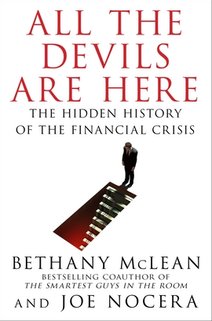
14 Nov 2010 00:46:56
The authors, both award-winning writers notable for their ability to bring dry and confusing financial ideas to life, thoroughly demonstrate that the roots of the current crisis never were hidden.
They anchor the story of modern housing finance in the federal government's move to create securities out of home mortgages in 1970. That's what first allowed lenders to share risk with investors and create more debt — and risk — than anyone previously imagined. With great wit and vitality, the authors outline the numerous characters who played big roles in the financial crash and housing market collapse, tracing everything back to the new math that grew from that moment.
The story is plain as day: Americans of all political and financial stripes increasingly believed in an all-new parallel narrative. In it, everyone could pretend they could afford bigger and bigger cars, more expensive houses and more of everything else — except regulation and personal discipline. Forget about fussy rules mandating 20 percent down payments. And banish all fear about escalating prices: As long as everything was spiraling upward, the new narrative made perfect sense, lifted all boats.
At its core, the story was about an intoxicating and uniquely American dream of home ownership, according to McLean and Nocera. The narrative let Federal Reserve Chairman Alan Greenspan recommend with a straight face against regulating mortgage securities and other derivatives because that would limit home ownership.
Government-sponsored businesses such as Fannie Mae, Ginnie Mae and Freddie Mac could expand beyond any previous understanding of what was sustainable as long as they talked about middle-class borrowers — even if the only people who ultimately benefited were wealthy and institutional investors. And the flamboyant leaders of the subprime lending giants Ameriquest and Countrywide could derive outlandish personal gains riding the belief in home ownership.
In the end, McLean and Nocera note, the net benefit of the housing boom was a less than two-percentage-point gain in home ownership, and it quickly evaporated in the crash. Not for a page do the authors let any political theory or party off the hook as they deftly weave arguments, refutations and facts upon facts in this gripping account.
They anchor the story of modern housing finance in the federal government's move to create securities out of home mortgages in 1970. That's what first allowed lenders to share risk with investors and create more debt — and risk — than anyone previously imagined. With great wit and vitality, the authors outline the numerous characters who played big roles in the financial crash and housing market collapse, tracing everything back to the new math that grew from that moment.
The story is plain as day: Americans of all political and financial stripes increasingly believed in an all-new parallel narrative. In it, everyone could pretend they could afford bigger and bigger cars, more expensive houses and more of everything else — except regulation and personal discipline. Forget about fussy rules mandating 20 percent down payments. And banish all fear about escalating prices: As long as everything was spiraling upward, the new narrative made perfect sense, lifted all boats.
At its core, the story was about an intoxicating and uniquely American dream of home ownership, according to McLean and Nocera. The narrative let Federal Reserve Chairman Alan Greenspan recommend with a straight face against regulating mortgage securities and other derivatives because that would limit home ownership.
Government-sponsored businesses such as Fannie Mae, Ginnie Mae and Freddie Mac could expand beyond any previous understanding of what was sustainable as long as they talked about middle-class borrowers — even if the only people who ultimately benefited were wealthy and institutional investors. And the flamboyant leaders of the subprime lending giants Ameriquest and Countrywide could derive outlandish personal gains riding the belief in home ownership.
In the end, McLean and Nocera note, the net benefit of the housing boom was a less than two-percentage-point gain in home ownership, and it quickly evaporated in the crash. Not for a page do the authors let any political theory or party off the hook as they deftly weave arguments, refutations and facts upon facts in this gripping account.

